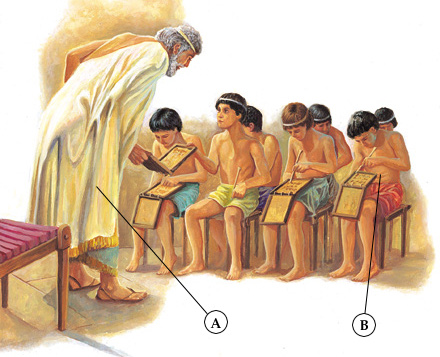Where in the world would you be without your elementary
education? You certainly wouldn’t be
here at BYU working on your post-secondary education. Education for children is at the basis of
civilization. Without it there are no
doctors, business men, artisans, teachers and so on. In any civilization, recent or ancient, you
can see there was a certain education system.
I’d like to focus on elementary education and its changes in recent
history and in ancient Greece.
In Greece, children started their elementary education
around seven years of age. It was
divided between formal and informal education.
Formal education was for those families who had the money to pay for a
pedagogue, or a private instructor, to teach their children. The pedagogue would teach in the family’s
home and would teach basic skills like reading, writing, and basic morals. Writing was done with a stylus onto a board
that was covered in wax. We can see
that although our education system has evolved it is quite similar to this.
So with all these changes is our children’s’ education
improving?
Works Cited
Albernaz, Lucelia, Personal Interview, December 3, 2014.
Ed. Sienkewicz, “Education and Training,” Ancient Greece (New Jersey: Salem Press,
Inc., 2007), 245.


Its funny how technology has changed education. I have a class this semester that is flipped; we watch lectures on learning suite and do homework and then come to class and go over the answers. In some ways that's nice because I can work when and where I want to, but it does make the class periods ridiculously boring because we literally just go over the material that we already learned at home. I wonder if this will affect ADHD diagnoses in little kids if they are as bored in class as I am. What was education like for the non-wealthy families in ancient Greece?
ReplyDelete